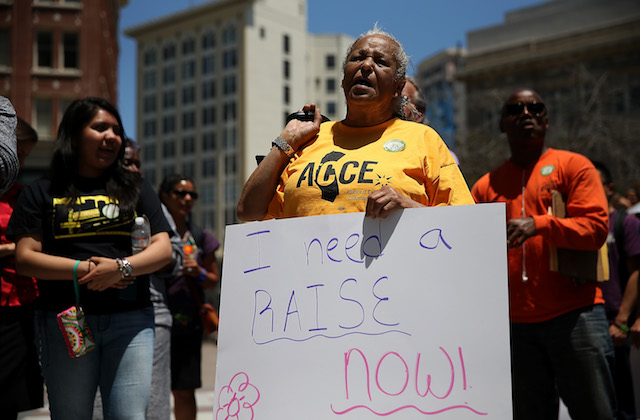The Fight for $15 just got a major boost. This afternoon (March 28), California governor Jerry Brown announced a plan that, if passed by state legislators, would make the state the first to institute a $15 an hour minimum wage.
The Los Angles Times reports that the proposed plan represents an agreement between the state and two labor unions that were planning to put the issue on the ballot for the November elections. The state’s minimum wage is currently set at $10. The plan calls for incremental increases on the first day of each year, starting with moving the wage to $10.50 on January 1, 2017, for companies with 26 or more employees and doing the same a year later for smaller companies. By January 2023, all California companies would have to pay their hourly employees at least $15 an hour. After 2023, the minimum wage would be increased annually with inflation (with a 3.5 percent ceiling each year).
It’s a move that would take a full-time hourly employee from making $20,800 annually to $31,200. The federal poverty level for a family of four is $24,300. The National Employment Law Project reports that, nationally, people of color are overrepresented in jobs that pay less than $15 an hour. While Latinos represent 16.5 percent of the workforce, they hold nearly 23 percent of sub-$15/hour jobs. And Blacks make up 12 make up 12 percent of the workforce, but hold 15 percent of those low-paying jobs.
The plan also allows for “off-ramp provisions,” which would let the governor pause any of the scheduled increases for up to a year if state’s job growth is negative for three or six months, if retail receipts are negative for the past 12 months, or if the budget is forecasted to be in deficit at the time of the increase.
“California is proving once again that it can get things done and help people get ahead,” Brown said in a press release about the deal. “This plan raises the minimum wage in a careful and responsible way and provides some flexibility if economic and budgetary conditions change.”
Critics say it will hurt the economy and result in layoffs. Tom Worstall writes on Forbes.com:
Reasonable estimates are that a 10 percent rise in the minimum wage will cause 2 and 3 percent more unemployment among the young and untrained (others perhaps 6 percent )–meaning non-high school graduates and others already dumped upon by the current economic order like black teens. And when there’s a Black teen unemployment rate of 30 percent (and more in places), we might think that’s something to worry about and we might not. It’s a moral judgement [sic], one that is up to each of us to reach.
Meanwhile, studies have shown that in places where the minimum wage has been increased, businesses have fared well, particularly in the restaurant industry. Gawker reports on a study from researchers at Cornell University:
[The] results of this study confirm previous findings, namely, that the relatively modest mandated increases in employees’ regular and tipped minimum wages in the past twenty years have not had large or reliable effects on the number of restaurant establishments or restaurant industry employment levels, although those increases have raised restaurant industry wages overall. Even when restaurants have raised prices in response to wage increases, those price increases do not appear to have decreased demand or profitability enough to sizably or reliably decrease either the number of restaurant establishments or the number of their employees. Although minimum wage increases almost certainly necessitate changes in restaurant prices or operations, those changes do not appear to dramatically affect overall demand or industry size. Furthermore, there is strong evidence that increases in the minimum wage reduce turnover, and good reason to believe that it may increase employee productivity as well.
